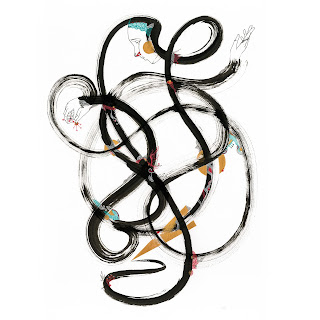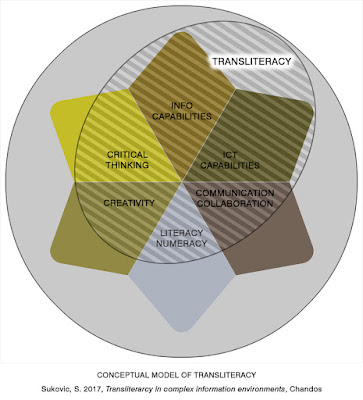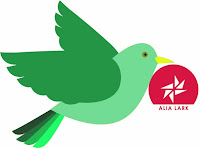 |
|
©2017 HABBENINK
|
By Suzana Sukovic
Library and information professionals ask themselves regularly what they can do better to support research. It is a worthy question, but the answers never go far enough simply because we can’t really support research anymore. And how are we going to do deal with that? In the nutshell, by becoming transliterate research specialists. It may sound like a contradiction in terms. Transliteracy (described as a fluidity of movement across a range of technologies, media and contexts) is about moving broadly while being a specialist means focusing on one area. But, professional dancers are transliterate specialists. With a rigorous dancing technique, physical and musical training, daily practice and a good deal of talent, they dance to different types of music, performing in theatres, dancing halls and on streets. Many information professionals are transliterate specialists in the way they go about their work, but their practices haven’t become an integral part of who we are as a profession.
As a researcher and a practitioner, I have worked with educators and academics for many years. I have heard over and over again about the overwhelming demands of daily work coupled with complex information and technological contexts. An academic who works on a research project, an educator who prepares online modules for health professionals, and a classroom teacher alike need someone to help them in navigating fast-paced information and technological changes.
And this is not enough. Developments in the knowledge field have become so far-reaching that our clients need an information specialist as a partner in taking their knowledge work further. An academic, Peter Read, wrote about our collaboration in a way that captures the nature of this type of partnerships, which have been sprouting across the globe:
Librarians well versed in digital humanities, I realise now, offer not only new ways of creative thinking, but epistemological insights into how to present historical knowledge and understanding to solve new problems. Issues of design, attractiveness, maneuverability and access are just part of what I understand to be a great deal more than an easy way of putting everything together.
Negotiation of shifting cultural norms adds a new layer of complexity to intricate knowledge landscapes. ‘Academic city of villages’, a model of how academics in the humanities live in their information worlds, is a reality for many scholars who negotiate disciplinary boundaries with a wish to work creatively and use abundant information outside their traditional domains. They need research partners who understand disciplinary cultures as well as epistemic frameworks, information sources and digital technologies.
The concept of transliteracy has captured the interest of information professionals over the last decade as it addresses many practices and challenges they observed in their work. As the information environments have become increasingly complex, existing practices of moving across media, technologies and contexts took new forms. A dynamic approach to understanding old and new information behaviours and related capabilities is needed. The conceptual model of transliteracy below provides a framework for thinking about transliteracy as an overarching concept in relation to other capabilities.
Applying these capabilities to the work of information professionals leads to reconceptualising our professional contribution to research. While we as a profession have all the capabilities which form transliteracy to some extent, it is the way we move across that makes new forms of our work possible.
The transliterate research specialist needs to assume three roles, which often overlap and merge as is the case in any transliterate work.
1. Transliterate research partner. In this role, the information specialist brings information from different domains to contribute to investigations, acting as an information broker with solid disciplinary, and the deep specialised knowledge of information landscapes. With the knowledge of digital tools and methods, s/he takes part in thinking about different ways of knowing applicable to the work at hand. Academics in particular need and greatly respect people who work with them not only on providing access to information, but who could also help them to take their understanding further. I have argued elsewhere for a resurrection of the highly respected Medieval librarian in the guise of the Librarian iScholar (Sukovic, 2011).
2. Translational researcher. Two useful models borrowed from medicine as a major field of applied research underpin thinking about this role. One is the model of teaching hospitals, which provide practical training for students, and enable connections between academia and practice. Another is translational research, which is based on the same principles. Translational research focuses on applying results of basic research into medical practice to improve health outcomes for patients. While there are many questions around translational research, it remains a valid and valuable approach to ensuring that research has outcomes in health services.
The health models are applicable to LIS as an applied discipline. ‘Teaching libraries’ could be grounded in the principles of connecting academic and practice-based research and training. Considering the richness and variety of contexts in which they operate, libraries and information centres have potential to become nodes of research activity. Investigations of fluctuating information needs and practices, and experimentation would lead to innovation and enable new insights. A number of disciplines could become partners in these investigations. The information professional as a translational researcher would not only bring results of research into practice, but would also take the role of translator between different knowledge domains.
3. Provider of transliteracy-enabling systems. In this role, the information specialist would develop systems to support flexible and meandering information paths. With a creative mind and high-order technological skills, the information specialist researches and creates information ecologies to support innovative thinking.
Many information professionals already do the work of the transliterate research specialist. The next step is to make it a norm and embed it in the way we operate as a profession. Instead of asking how we can be better research supporters, we need to ask how we can be better research partners. The key is in thinking creatively how we can use our rigorously developed capability sets in amphitheatres, public libraries, digital classrooms and on the streets.
Book Transliteracy in complex information environments (Chandos, 2017) is available from Elsevier store
References
SUKOVIC, S. 2011 E-texts in research projects in the humanities. In: WOODSWORTH, A. (ed.) Advances in Librarianship, Vol. 33. Bingley: Emerald Group Publishing Limited.
.



0 Comments